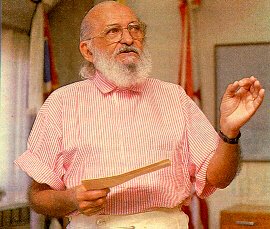
Paulo Freire was a Brazilian educator, who was born in 1921 in a city called Recife. Due to the Great Depression the country was divided into high and low classes, and as a consequence his parents suffered from severe financial problems that led him to know hunger and poverty at a young age. So, it was in his childhood that he determined to dedicate his life to the struggle against hunger. In 1944, he married Elza Oliveira who was an elementary school teacher. Consequently, his interests in theories of education began to grow and as a result, he did more extensive reading in education, philosophy and sociology of education. Freire began to work as the Director of the Department of Education in Brazil, and his experiences during those years brought him into adult education.
His theories of education gave him international fame as well as political persecution in his own country to the extent that he was imprisoned and subsequently exiled to Chile and the United States. His international recognition was the result of several experiments of literacy training. One of them was called “Bare feet can also learn to read” in which he taught illiterate workers to read and write in 45 days.
In 1965, due to the violent situation in The USA and Southern Asia among other places, Freire found that repression and exclusion of the powerless were a global phenomenon. Therefore, violence became a great concern in his writings leading him to write his most famous work called “Pedagogy of the Oppressed.” In this book, he emphasised the idea of learning as an act of culture and freedom, and he argued that through learning and conscientization people became aware of the oppression, so as to liberate themselves from that oppressive reality.


3 comments:
To be honest, I think that during my experience at school, I didn't attend any class which suggested a Freirean approach towards education. My teachers did not have any desire to get to know or interact with their students. I have only seen some of Freire's ideas applied in a couple of our classes at college. For example, regarding Dialogue as a useful means of conversation and interaction, I'm only aware of this because of two of our teachers.In my opinion, I think that his idea of making a relation between the teacher and the students is a good one, as I believe that this new way of teaching is more convenient and interesting for all of us.
As a teacher-to-be, there were lots of his ideas that I would like to try in my future lessons, because I really like Freire's ideas about teaching:
Firstly, the idea of the teacher as a facilitator is really interesting, because it is a means of encouraging the students to learn and become more independent at the time of learning, looking for information and doing research. I agree when Paolo Freire said that the teacher should avoid “depositing” knowledge (this is what he defined as “Banking” in education) and focus on collective knowledge from shared experience.
Secondly, using Dialogue as an educational form is also an idea that I would like to apply, as through conversation people get to know one another, can share their ideas and beliefs and respect others as equals. I think that we must change the common belief that the teacher is the “supreme” authority and the students have to do whatever he says.
Thirdly, I like Freire's idea of teaching through the discussion of the students' experience of life as I think that a person can learn if he associates his own experience to others'. I agree with him when he said that we have to find out more about our students' lives and ways of looking at the world, as everyone can only understand things through their own experience and reasoning.
Dear Debora, as a Brazilian, I´m glad to see you mentioning a Brazilian educator here in your blog.Also, I´m happy to see that Freire´s brilliant and important ideas make you think so critically about your profession.
I love Freire´s idea of participation and interaction as the basic role within the classroom in which teachers become students and students in a way become teachers. Freire makes us think again how education brings about dignity and becomes the most important tool we have in our life.
Post a Comment